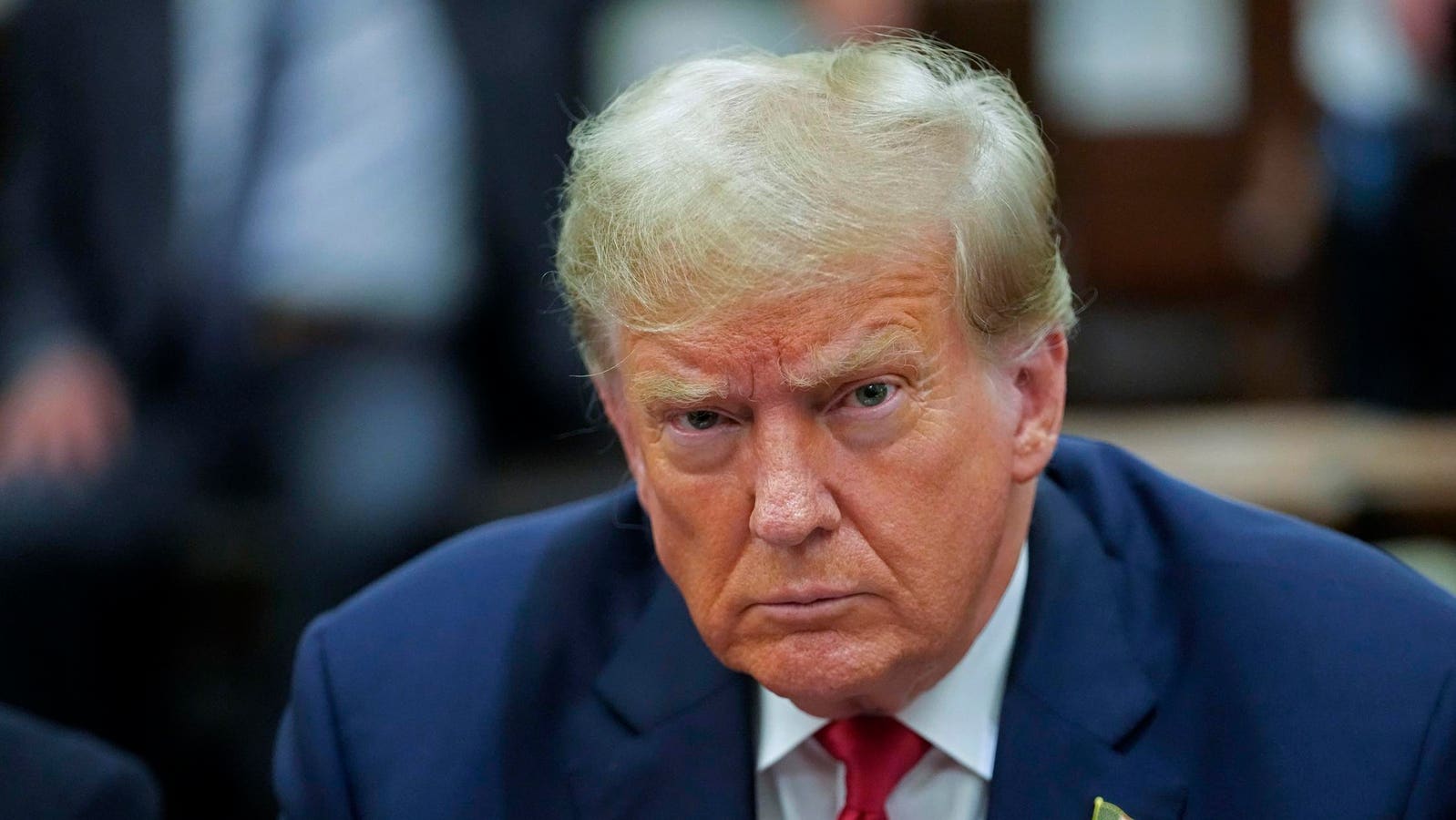Topline
President Donald Trump is no longer liable for the more than $450 million he had been ordered to pay in the civil fraud case against him and his business associates, as a New York appeals court ruled Thursday that the nine-figure judgment for misstating the value of his assets was “excessive”—without reaching a decision on whether the ruling finding Trump liable for fraud should be overturned.
Former President Donald Trump appears in the courtroom for the third day of his civil fraud trial at New York State Supreme Court on October 4, 2023 in New York City.
Getty Images
Key Facts
A panel of New York appeals judges threw out the massive fine levied as part of Engoron’s judgment, which found that Trump and his business associates fraudulently inflated the value of assets in order to obtain better business deals and reflect a higher net worth for Trump.
New York Attorney General Letitia James sued Trump and his co-defendants arguing they had committed fraud by misstating the value of assets, and Engoron agreed, ruling Trump and his business associates, including his sons, knew the numbers they were listing were false and ordering the defendants to pay millions of dollars in fines each.
The judges did not reach a majority on determining whether Trump was correctly found liable for fraud or throw out non-monetary consequences Engoron imposed—like restricting Trump and his associates’ ability to do business in New York—as two judges ruled the fine was excessive but Engoron was correct to find him liable, while other judges took issue with the merits of the initial fraud ruling.
“While harm certainly occurred, it was not the cataclysmic harm that can justify a nearly half billion-dollar award to the State,” judges wrote about the fines levied against Trump and his co-defendants, arguing New York “is not entitled to compound its victory with a massive punitive fine” and that the size of the fine is disproportionate to the amount of money the state lost as a result of the misstated valuations.
The ruling will clear Trump of the massive nine-figure fine he stood to pay in the case, but both parties can still appeal the ruling to New York’s highest state court, keeping the case alive.
James said in a statement she will appeal the court’s ruling and praised the judges for not striking down the non-monetary penalties Engoron ordered, while Trump claimed on Truth Social the ruling was a “TOTAL VICTORY”—even as it didn’t absolve him of the fraud allegations—and thanked the court for “having the Courage to make this Decision.”
Chief Critic
“It should not be lost to history: yet another court has ruled that the president violated the law, and that our case has merit,” James said in a statement Thursday, adding her office “will seek appeal … and continue to protect the rights and interests of New Yorkers.”
What To Watch For
It remains to be seen if Trump could also appeal Thursday’s ruling—since it threw out the judgment but also didn’t clear Trump of the fraud allegations themselves—in addition to James’ promise to appeal. The appeals court’s Thursday ruling will stand if New York’s highest court decides not to take the issue up. Trump has already paid $175 million into a court-controlled account while the appeals process plays out, after he was allowed not to pay the full judgment right away because Trump argued he couldn’t pay. Whether or not he’ll get that money back will depend on how the appeals process continues to play out: The money will stay locked up until the appeals process fully concludes, so Trump won’t get that money back for now, but will if New York’s Court of Appeals—its highest court—upholds Thursday’s ruling or declines to take up the case.
What About Trump’s Presidency?
Unlike criminal cases against Trump, whave were been derailed in the wake of his election, civil cases are still allowed to proceed even when he’s in the White House. The Supreme Court ruled in Clinton v. Jones that presidents can still be held liable in civil court for actions before they took office. That means the civil fraud case has not been affected by Trump’s election, and other civil cases against him—like writer E. Jean Carroll’s two defamation cases—can still move forward.
Big Number
$517 million. That’s approximately how much Trump owed in damages in the civil fraud case as of Thursday, before the appeals court wiped it out. The interest on his initial $454.2 million judgment has gone up by $111,984 per day, based on a 9% annual interest rate, and $24 million had been added to his judgment by the time the appeals court heard the case in September 2024 alone.
Forbes Valuation
Forbes estimates Trump’s net worth at $5.5 billion as of Thursday morning. His net worth has gone up significantly since Engoron’s ruling in the fraud case was released in February, when Trump was only worth approximately $2.6 billion. That extra money is thanks to Trump’s stake in Truth Social’s parent company, however, which he has so far been unwilling to sell.
News Peg
The court’s ruling comes nearly a year after the appeals court judges heard oral arguments in September 2024, but only a few weeks after reports emerged that Trump’s Justice Department is now investigating James over the civil fraud case. Prosecutors issued a subpoena to James’ office for documents related to the litigation earlier this month, multiple outlets reported, which The New York Times reports is part of an investigation into whether the case violated Trump’s civil rights. Trump has long lashed out against James over the litigation and claimed she’s a “crook,” and his administration is also reportedly investigating her office’s separate case against the National Rifle Association and the attorney general’s personal real estate transactions. James has opposed the investigation, and her attorney Abbe Lowell attorney said in a statement, “Investigating the fraud case Attorney General James won against President Trump and his businesses has to be the most blatant and desperate example of this administration carrying out the president’s political retribution campaign.”
Key Background
James brought her case against Trump and his associates in 2022, alleging they had misstated the value of assets more than 200 times across a 10-year period, including for key Trump properties like his Florida Mar-a-Lago estate. The case went to trial in fall 2023, as Trump’s lawyers argued the valuations were correct and based on Trump’s real estate expertise. They also blamed any issues with the valuations on the company’s accountants, rather than Trump or his sons. Engoron found Trump and his co-defendants liable for misstating the value of their assets even before the case went to trial, but ruled against them again in February based on the proceeding, finding Trump and his associates had knowingly misstated the value of those assets for personal gain. Engoron argued there was “overwhelming evidence” suggesting Trump and his sons signed off on documents knowing the numbers were false, and the ex-president “was aware of many of the key facts underpinning various material fraudulent misstatements” in the financial statements. Trump has long opposed the allegations against him and denied any wrongdoing in the case. The appeals court’s ruling came after the panel of judges signaled during oral arguments in September 2024 they were skeptical of Engoron’s sweeping decision, questioning James being allowed to bring a case to “upset a private business transaction” between “equally sophisticated partners” and arguing, “There has to be some limitation on what the attorney general can do.” The judges also questioned the nine-figure judgment against Trump during their arguments, suggesting the size of the fine was “troubling” given the businesses Trump worked with “left these transactions happy.”
Tangent
In addition to the significant penalties that Engoron imposed, the civil fraud trial also resulted in Trump’s longtime CFO Allen Weisselberg serving time in prison, after he pleaded guilty to perjury based on comments he made in the case. Forbes reported during the trial that Weisselberg falsely claimed he didn’t know about the Trump Organization vastly inflating the reported square footage of Trump’s penthouse apartment and “never focused” on the asset, as notes from Forbes reporters showed Weisselberg repeatedly emphasized the penthouse and its value and was present at a meeting where Trump pushed the false size. Weisselberg was charged based on those comments at trial, but ultimately pleaded guilty to perjury based on other comments he made as part of a 2020 deposition in the case, in which he claimed he didn’t know about the discrepancy over the penthouse’s size until a Forbes article came out in May 2017 reporting it had been falsely valued. Emails show Forbes made Weisselberg aware of its reporting long before the piece was published, and internal emails show the CFO was sent documents with the correct size. Weisselberg was released early from prison in July on good behavior after serving a 100-day sentence, down from the five months he was initially sentenced to.
Further Reading
ForbesAppeals Court Questions Trump’s ‘Troubling’ $450 Million Fine In Civil Fraud CaseBy Alison DurkeeForbesTrump Owes $500 Million For His New York Fraud Case — Now His DOJ Is Investigating The Attorney GeneralBy Alison DurkeeForbesTrump Already Owes $24 Million More In Fraud Case As It’s Heard On AppealBy Alison DurkeeForbesHere’s How Much Donald Trump Is WorthBy Dan AlexanderForbesNew York AG Letitia James Rejects Trump’s Request To Drop Civil Fraud LawsuitBy Sara Dorn











